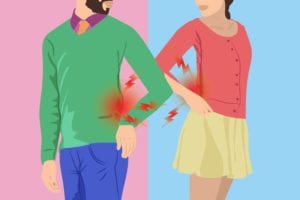

Ankylosing spondylitis (AS) typically causes lower back pain and stiffness, among many other symptoms, so it’s not exactly surprising to learn that a new study confirmed people who have this inflammatory, chronic condition report that their quality of life is lower than average. But the research, published in the journal Arthritis Research & Therapy, also revealed some interesting details that suggest how patients can help improve their health and happiness, despite having this disease.
And studies like this are important to make sure doctors and other care providers better understand the debilitating impact that AS can have on patients’ quality of life.
According to the study, which was a survey of 210 AS patients (plus a group of healthy control subjects) in Sweden, people with AS had an average “physical” quality of life score of 41.3 compared to 49.1 in the control group. (50 is considered a typical score in general.) The AS patients had an average mental quality of life score of 44.6 versus 50.5 in control subjects.
As expected, AS patients with higher levels of disease activity who had been living with the disease for a longer duration were most apt to report the most physical problems like pain and difficulty performing everyday tasks. But factors that influenced mental wellness seemed to vary by sex.
In men, worse mental quality of life was linked with higher levels of education, more fatigue, and — interestingly — fewer radiographic spinal changes (bone damage that can be seen on imaging tests). It’s possible, the authors noted, that patients who had not been living with AS long enough to develop more of these changes hadn’t yet had a chance to figure out “adaptive coping strategies.”
In women, worse mental quality of life was most tied to fatigue, high level of disease activity, and living alone without a partner. (Here’s more data on how AS affects personal relationships.)
Although additional research on how AS affects patients’ physical and mental quality of life, the study authors say that “by using these variables as a guide, patients may be treated more efficiently, leading to reduction in disease activity, pain and fatigue thus potentially improving both the [physical and mental quality of life] as has been shown in some clinical trials.”
Keep Reading
- A New Genetic Test Can Predict Who’s Likely to Get Ankylosing Spondylitis (and Make It Much Easier to Get Diagnosed Quickly)
- Modeling Is My Medicine’: Why This Woman’s Ankylosing Spondylitis Diagnosis Makes Her Want to Walk the Runway
- Is Your Back Pain Inflammatory or Mechanical: 8 Questions That Can Let You Know





